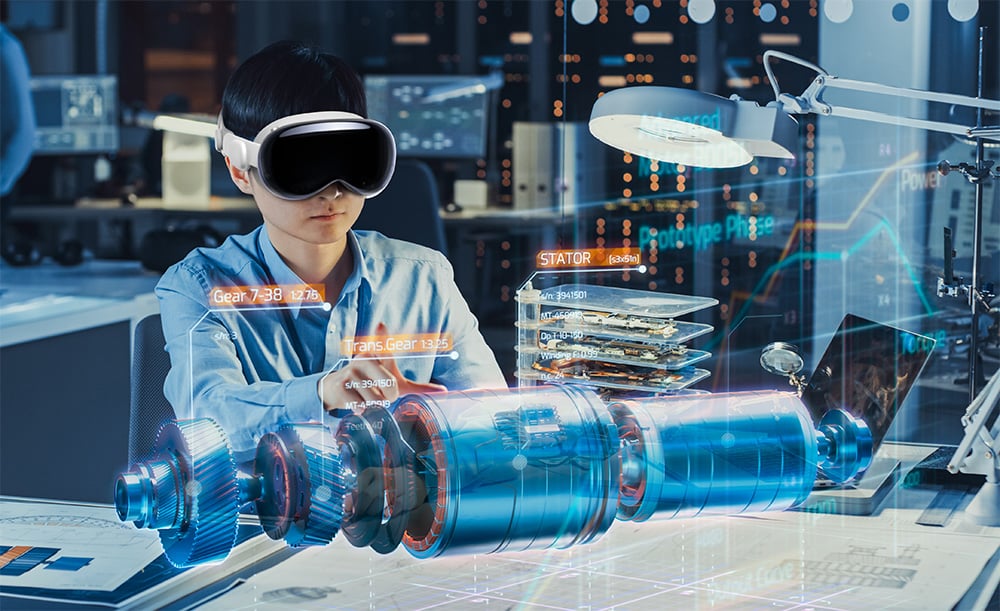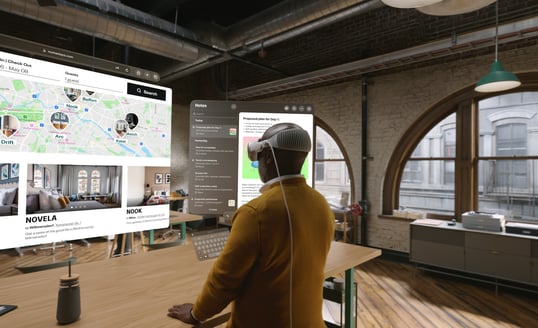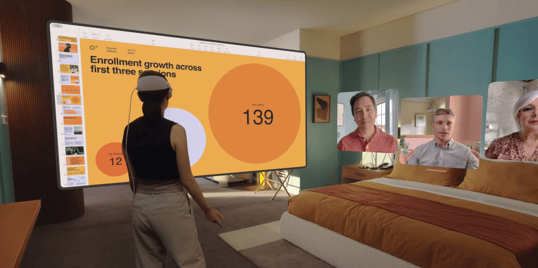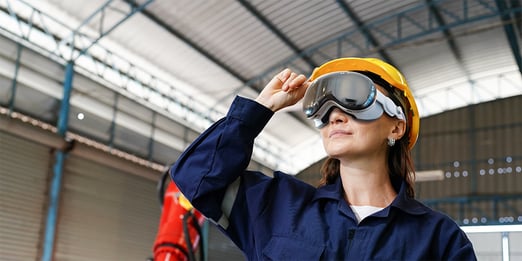Is Apple Vision Pro a fit for frontline workers?
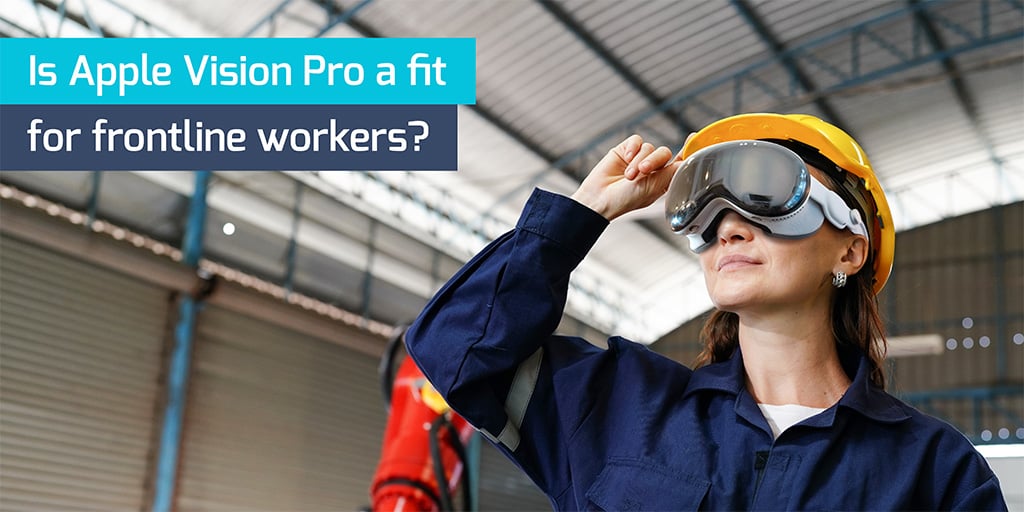
What is Apple Vision Pro? |
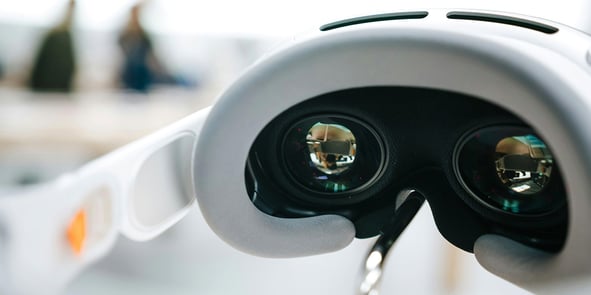
The Apple Vision Pro is presented as an extension or even a substitute for a conventional desktop setup.
|
Apple unveiled its long-awaited mixed reality headset, the Apple Vision Pro this February 2nd. Developed over a year, this cutting-edge device introduces spatial computing while offering limitless display possibilities as demonstrated in Apple's guided tour. |
Is it an AR/VR headset? |
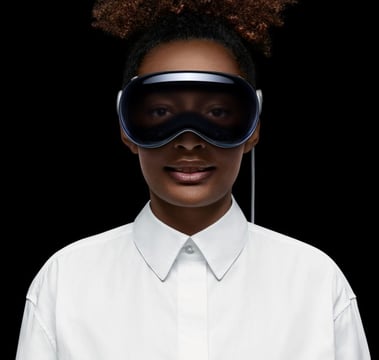
Though Apple doesn’t market these glasses explicitly as augmented reality (AR) or virtual reality (VR) glasses, they refer to them as a 'spatial computer' that integrates digital media into the real world.
These glasses are like a mix of a VR and AR headset. With VR, you are completely in a virtual world, but with AR, you still see your real surroundings. So, with the Vision Pro, you can enjoy games or movies while also being aware of your actual room.
This 'spatial computer' employs advanced technologies such as eye tracking, motion gestures, and speech recognition to facilitate interactions. These physical inputs enable users to engage with the system intuitively, enhancing the overall user experience.
Limitless display possibilities |
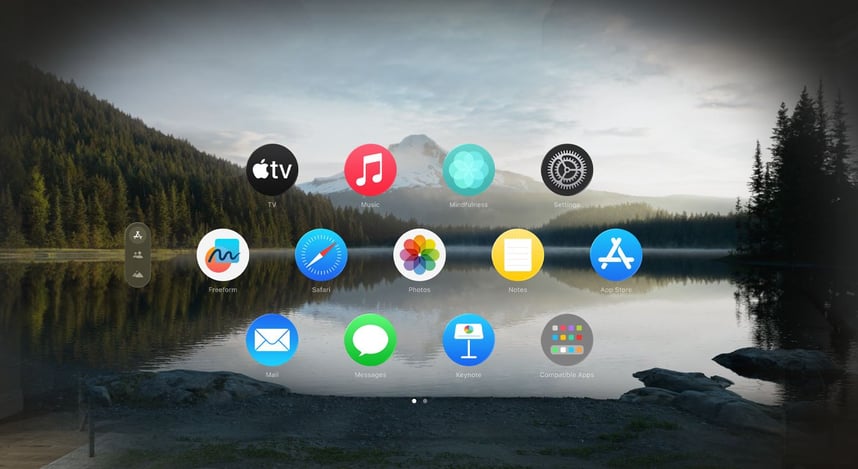
The Apple Vision Pro changes the way users interact with their favorite apps, capture memories, watch TV shows and movies, and connect via FaceTime, offering a new dimension to personal computing.
While Vision Pro offers numerous capabilities, here are some potentials in a brief:
-
Apple Vision Pro supports productivity tools like Excel, Webex, and Slack, while also providing immersive entertainment with a virtual 4K HDR display.
-
The headset supports spatial videos, offering users the ability to immerse themselves in moments captured in time. With the ability to scale up screens and create a movie theater-like experience, Vision Pro expands the concept of workspace beyond traditional monitors, allowing users to work in any dimension.
-
Furthermore, the Vision Pro seamlessly integrates with Mac devices, allowing users to transform their Mac into a large virtual screen.
-
Possible addition of industry and medical applications.
What sets Apple Vision Pro apart from other AR/ VR headsets? |
Intuitive interactions |
It enables navigation through eye, hand, and voice commands, providing a unified experience. |
Spatial operating system |
An adaptable spatial operating system seamlessly blends with your environment. |
High pixel density |
Users can enjoy an exceptional viewing experience with pixel density surpassing that of a 4K TV. |
Spatial productivity |
One can experience spatial productivity with improved web browsing, messaging, and note-taking capabilities. |
Extensive sensory integration |
Extensive sensory integration is achieved by 6 microphones, 12 cameras, and 23 million pixels. |
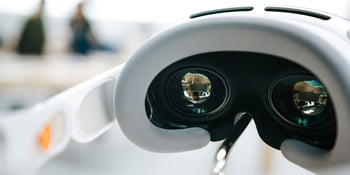 "Apple has made an impressive impact in the AR/VR space with the AVP, showcasing their innovative approach through intuitive eye, hand, and finger tracking for user interaction.
"Apple has made an impressive impact in the AR/VR space with the AVP, showcasing their innovative approach through intuitive eye, hand, and finger tracking for user interaction.
This technology enables powerful experiences, whether immersive or not, thanks to the incorporation of their spatial computing chip. When coupled with the Apple development platform, it becomes evident the direction Apple aims to pursue in terms of hardware and user experience.”
Robert Helm
US Branch Director AMA
What are the use cases of Apple Vision Pro for companies? |
While many people are excited about the entertaining features of this device, its importance goes beyond just entertainment.
- Enhanced productivity
The Vision Pro's innovative design provides users with a three-dimensional interface, enabling access to apps from any location. This device supports the simultaneous opening of multiple screens, which users can organize within their virtual space using voice recognition, as well as eye and hand-tracking inputs.
Potential use cases include creating and organizing presentations, refining prototypes and 3D models, and sketching designs that come to life right before your eyes.
| Example |
|
Potential use cases include creating and organizing presentations, refining prototypes and 3D models, and sketching designs that come to life right before your eyes. |
- Immersive learning & training
Fields like aviation, healthcare, and manufacturing can utilize spatial computing for lifelike training simulations. This type of training eliminates the expense of physical training spaces while enhancing the capabilities and readiness of trainees.
|
Example |
|
In the aviation industry, pilots can undergo immersive simulations using spatial computing, which replicates real-world scenarios like take-offs, landings, and emergencies. This training allows pilots to hone their skills in a safe and controlled environment without the need for expensive flight simulators. |
- Remote collaboration
Vision Pro introduces a new era of remote collaboration. Virtual meetings become more immersive, creating a sense of co-presence among participants. This innovation greatly benefits remote teams, enhancing communication and teamwork dynamics.
|
Example |
|
A team of engineers spread across different locations can use the Apple Vision Pro for a virtual design review. They can manipulate 3D models together, providing real-time feedback as if they were physically present in the same room. |
- Healthcare
Surgeons can utilize it for precise planning and simulation of intricate medical procedures, while medical students can enhance their skills and confidence by practicing surgeries in a safe virtual setting.
|
Example |
|
Surgeons can use the Apple Vision Pro to simulate a delicate heart surgery, allowing them to meticulously plan each step and anticipate potential complications. Medical students can then practice the same procedure in the virtual environment, gaining valuable experience and improving their surgical techniques without risking patient safety. |
- Remote Assistance
Remote Assistance field technicians can receive live guidance from experts via augmented reality overlays. This support accelerates troubleshooting and maintenance tasks, minimizing downtime and boosting overall efficiency.
|
Example |
|
Imagine a scenario in manufacturing where a factory technician encounters a complex machinery issue. With Remote assistance enabled by Apple Vision Pro, the technician can connect with expert engineers who can provide live guidance through augmented reality overlays. This allows the technician to see step-by-step instructions and visual cues directly in their field of view, accelerating troubleshooting and maintenance tasks. |
|
As appealing as it may seem, the Apple Vision Pro also comes with its share of disadvantages.
|
Since they are not designed for industrial settings, they may pose challenges in immediate adoption for frontline workers.
A quick overview of alternative technologies for professional applications |
If you are seeking other AI-optimized wearables and smart glasses specifically tailored for industrial use, consider the following alternatives:
| RealWear Navigator N520 | Vuzix M400 | Moziware Cimo |
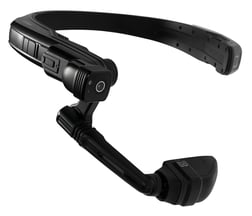 |
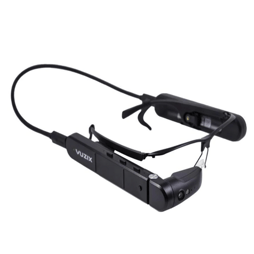 |
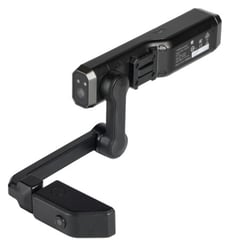 |
| These alternatives offer several advantages for industrial settings: |
|
Conclusion |
Apple Vision Pro represents a big leap forward in display technology. Wearable technologies like this hold immense potential for transforming industries, and enhancing collaboration, productivity, and the safety of frontline workers.
There are several different connected glasses available on the market, each with its advantages and disadvantages. It's important to choose the glasses that best suit your specific needs. If you require a powerful and versatile solution, Apple Vision Pro is an excellent choice. For more affordable and robust solutions suitable for industrial and medical use cases RealWear, Vuzix, or moziware may be preferable options. To ensure the best decision, carefully evaluate the advantages and drawbacks of each option to align with your business objectives.
.
